Theories and Ideologies Influence on Educators
The assignment requires a critical exploration, analysis, and evaluation of how theories and ideologies influence good practice for educators.
21 Pages6610 Words391 Views
Added on 2023-04-20
About This Document
This essay explores the influence of theories and ideologies on educators and their practices. It discusses the impact of behaviorism, cognitivism, and constructivism theories on education. It also highlights the importance of educators in student achievement.
Theories and Ideologies Influence on Educators
The assignment requires a critical exploration, analysis, and evaluation of how theories and ideologies influence good practice for educators.
Added on 2023-04-20
ShareRelated Documents
Running head: THEORIES AND IDEOLOGIES INFLUENCE ON EDUCATORS
Critical Exploration, Analysis and Evaluation of how Theories and Ideologies influence
good practice for Educators
Name of the Student
Name of the University
Author’s Note:
Critical Exploration, Analysis and Evaluation of how Theories and Ideologies influence
good practice for Educators
Name of the Student
Name of the University
Author’s Note:
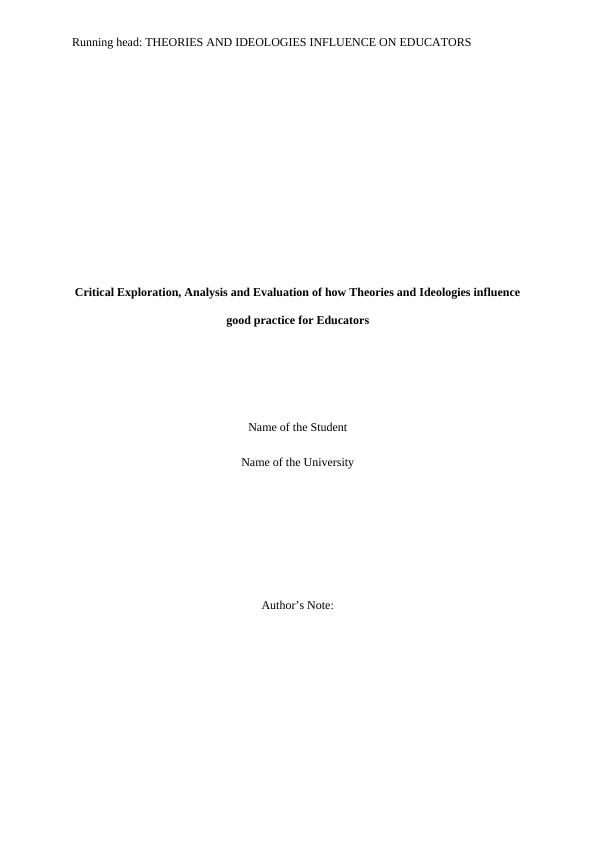
1
THEORIES AND IDEOLOGIES INFLUENCE ON EDUCATORS
Introduction
Education can be stated as the core procedure to facilitate learning as well as proper
acquisition of skills, habits, beliefs, values and knowledge (Daniels 2005). The educational
methods majorly involve discussion, teaching, story telling, directed research and training.
Education eventually takes place under the proper guidance of educators; however the
learners could even educate themselves subsequently without any type of complexity. It
could take place either in formal or informal setting and any experience, which has a
formative effect on the method that anybody could think, feel or act after considering
education. This specific and distinct methodology of teaching is termed as pedagogy
(Gardner 2006). The formal education is commonly sub divided into significant stages like
kindergarten or preschool, primary school, secondary school, college, university and
apprenticeship. Education is extremely important and significant and to some extent it is
compulsory for the individuals within any organization.
I work as a grade 2 primary school teacher at Shen Waitlist International School in
Shenzhen China. China has always focused on their unique education system by providing
major advantages to the students as well as their educators. I have gained hand on experience
due to the better and updates technology or technological advances. As per rules and
regulations of China education system, each and every citizen should attend school for at
least nine years and this is known as nine year compulsory education, which is being funded
by the government. This type of compulsory education involves six years of primary
education that starts from age of six, following three years of junior secondary school until
age of 12.
There are several theories, approaches and ideologies of education that have a
stronger impact on good practice of education for the educators (Gipps 2002). These distinct
THEORIES AND IDEOLOGIES INFLUENCE ON EDUCATORS
Introduction
Education can be stated as the core procedure to facilitate learning as well as proper
acquisition of skills, habits, beliefs, values and knowledge (Daniels 2005). The educational
methods majorly involve discussion, teaching, story telling, directed research and training.
Education eventually takes place under the proper guidance of educators; however the
learners could even educate themselves subsequently without any type of complexity. It
could take place either in formal or informal setting and any experience, which has a
formative effect on the method that anybody could think, feel or act after considering
education. This specific and distinct methodology of teaching is termed as pedagogy
(Gardner 2006). The formal education is commonly sub divided into significant stages like
kindergarten or preschool, primary school, secondary school, college, university and
apprenticeship. Education is extremely important and significant and to some extent it is
compulsory for the individuals within any organization.
I work as a grade 2 primary school teacher at Shen Waitlist International School in
Shenzhen China. China has always focused on their unique education system by providing
major advantages to the students as well as their educators. I have gained hand on experience
due to the better and updates technology or technological advances. As per rules and
regulations of China education system, each and every citizen should attend school for at
least nine years and this is known as nine year compulsory education, which is being funded
by the government. This type of compulsory education involves six years of primary
education that starts from age of six, following three years of junior secondary school until
age of 12.
There are several theories, approaches and ideologies of education that have a
stronger impact on good practice of education for the educators (Gipps 2002). These distinct
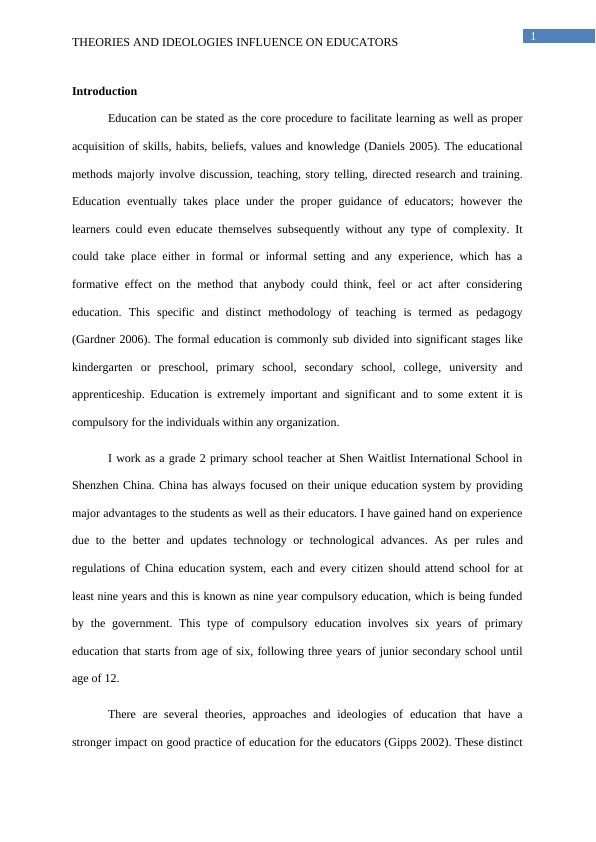
2
THEORIES AND IDEOLOGIES INFLUENCE ON EDUCATORS
ideologies are hence responsible for bringing major changes in the educational sector of
china. The most important and significant theories and ideologies that are relevant for the
learning and education are behaviourism theory, cognitive information processing or
cognitivism theory and constructivism theory. Each of these above mentioned theories and
ideologies are extremely effective and efficient for exploring and evaluating the subsequent
reasons and practices of better education (Illeris 2013). The following essay outlines a brief
description on the critical exploration, analysis and evaluation of the procedure of various
theories as well as ideologies influence on the good practice for educators. Several learning
theories will be analysed and evaluated and the wider ideas regarding purpose, methods and
values of education on the practice of teachers with proper details in this particular essay.
Discussion
Exploration and Analysis of Impact of Educators on Student Achievement
Education is a gradual procedure that brings out positive changes within human life
and behaviour (Black, Harrison and Lee 2003). It is effective and efficient for acquiring
knowledge through studies and impartment of knowledge by the significant methodologies of
instructions and few other practical procedures. Education helps people in learning how to do
the things and encourages them in thinking regarding what should be learnt. It is extremely
important and significant for the educators in teaching relevant methods for finding and
utilizing information. With the help of education, the knowledge of country, society as well
as of the world being passed from one generation to the other (Adey and Dillon 2012). The
students are supposed to learn the procedure of being effective and active citizens. Proper
transformation from any one class to the other class is possible with proper education. The
empowered societies, countries and individuals by education are taking a respective edge
over the individuals stand on the growth pyramid.
THEORIES AND IDEOLOGIES INFLUENCE ON EDUCATORS
ideologies are hence responsible for bringing major changes in the educational sector of
china. The most important and significant theories and ideologies that are relevant for the
learning and education are behaviourism theory, cognitive information processing or
cognitivism theory and constructivism theory. Each of these above mentioned theories and
ideologies are extremely effective and efficient for exploring and evaluating the subsequent
reasons and practices of better education (Illeris 2013). The following essay outlines a brief
description on the critical exploration, analysis and evaluation of the procedure of various
theories as well as ideologies influence on the good practice for educators. Several learning
theories will be analysed and evaluated and the wider ideas regarding purpose, methods and
values of education on the practice of teachers with proper details in this particular essay.
Discussion
Exploration and Analysis of Impact of Educators on Student Achievement
Education is a gradual procedure that brings out positive changes within human life
and behaviour (Black, Harrison and Lee 2003). It is effective and efficient for acquiring
knowledge through studies and impartment of knowledge by the significant methodologies of
instructions and few other practical procedures. Education helps people in learning how to do
the things and encourages them in thinking regarding what should be learnt. It is extremely
important and significant for the educators in teaching relevant methods for finding and
utilizing information. With the help of education, the knowledge of country, society as well
as of the world being passed from one generation to the other (Adey and Dillon 2012). The
students are supposed to learn the procedure of being effective and active citizens. Proper
transformation from any one class to the other class is possible with proper education. The
empowered societies, countries and individuals by education are taking a respective edge
over the individuals stand on the growth pyramid.
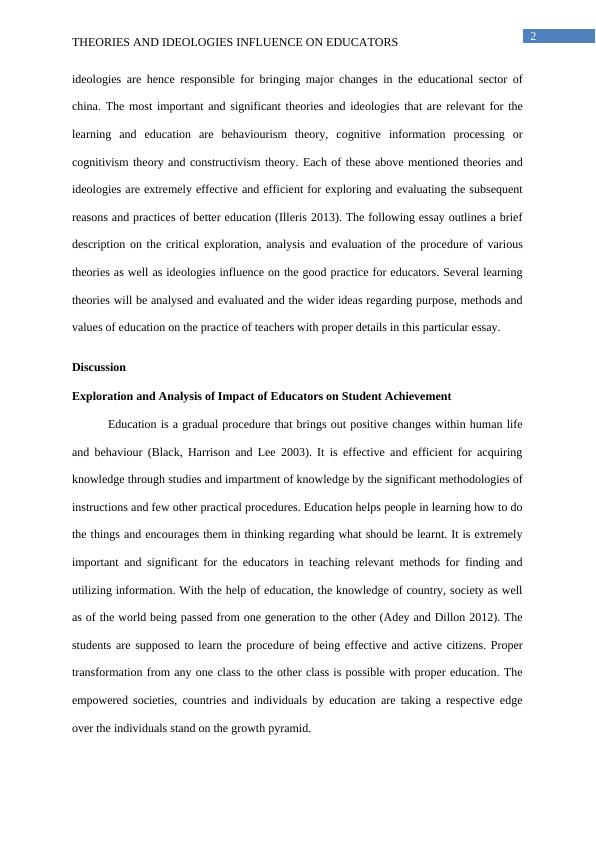
3
THEORIES AND IDEOLOGIES INFLUENCE ON EDUCATORS
There are three types of education, which are formal, informal and non formal
education. The description of these three types of education is provided below:
i) Formal Education: The formal learning or education generally takes place, in
which any person might learn the trade, academic and basic skills or knowledge (Liston and
Zeichner 2013). The most significant examples of this formal education are learning within
any classroom, planned education of various subjects after attending an institution. The early
education is gained by a child from his or her teachers as well as family members. The most
important and significant characteristics of formal education are hierarchical structure,
planned and deliberate, chronological grading system and many others (Schunk 2012).
Moreover, both the students and the teachers are majorly aware of the significant factors and
hence engage themselves within the procedure of education.
ii) Informal Education: Informal education is the parenting teaching to their children
regarding the procedure of preparing for their career. The individuals could even obtain this
information education by simply reading several books from library as well as educational
websites. This type of education does not involve any specific learning method or model and
conscious efforts are not involved here (Kassem, Mufti and Robinson 2006). Information
education is neither deliberate not previously planned. Moreover, there is no fixed time table
for completing such education and no set of education is required here. Various experiences
are considered here and few of the basics like numeric characters are taught in informal
education. The most basic example of such example is someone learning his or her mother
tongue (Daniels 2005). Major features of informal education mainly involve indefinite of
boundary walls, no definite syllabus, lack of pre planning, data from any source like life
experiences, friends and family and many more.
THEORIES AND IDEOLOGIES INFLUENCE ON EDUCATORS
There are three types of education, which are formal, informal and non formal
education. The description of these three types of education is provided below:
i) Formal Education: The formal learning or education generally takes place, in
which any person might learn the trade, academic and basic skills or knowledge (Liston and
Zeichner 2013). The most significant examples of this formal education are learning within
any classroom, planned education of various subjects after attending an institution. The early
education is gained by a child from his or her teachers as well as family members. The most
important and significant characteristics of formal education are hierarchical structure,
planned and deliberate, chronological grading system and many others (Schunk 2012).
Moreover, both the students and the teachers are majorly aware of the significant factors and
hence engage themselves within the procedure of education.
ii) Informal Education: Informal education is the parenting teaching to their children
regarding the procedure of preparing for their career. The individuals could even obtain this
information education by simply reading several books from library as well as educational
websites. This type of education does not involve any specific learning method or model and
conscious efforts are not involved here (Kassem, Mufti and Robinson 2006). Information
education is neither deliberate not previously planned. Moreover, there is no fixed time table
for completing such education and no set of education is required here. Various experiences
are considered here and few of the basics like numeric characters are taught in informal
education. The most basic example of such example is someone learning his or her mother
tongue (Daniels 2005). Major features of informal education mainly involve indefinite of
boundary walls, no definite syllabus, lack of pre planning, data from any source like life
experiences, friends and family and many more.
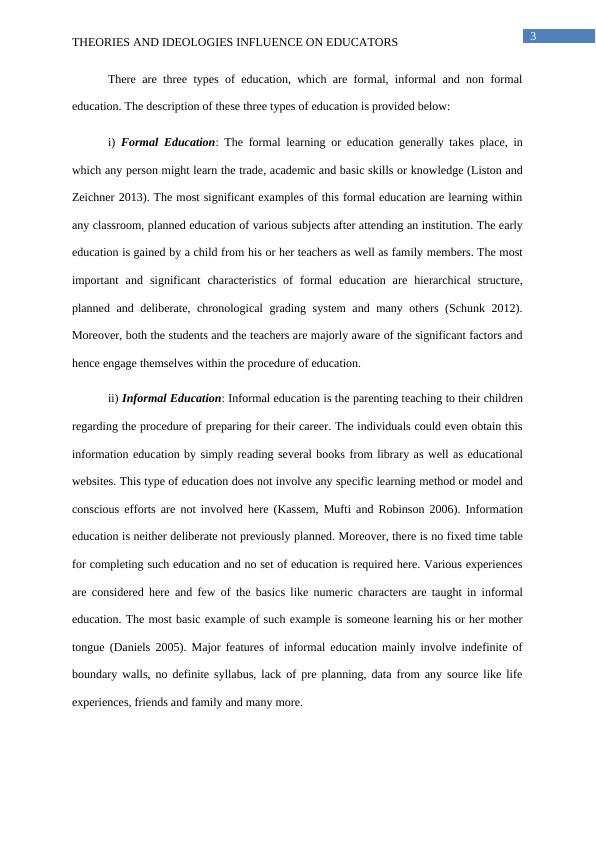
4
THEORIES AND IDEOLOGIES INFLUENCE ON EDUCATORS
iii) Non Formal Education: The third type of education is non formal education. It
includes adult basic education, adult literacy education as well as school equivalency
preparation (Walkup 2013). For the non formal education anyone who could learn literacy,
job skills and other specific skills are termed as proper students of this education type.
Moreover, distance learning, home education, computer assisted instructions and
individualized instructions are the major possibilities. This non formal education is being
imparted consciously and the implementation is done systematically and deliberately.
Informal education is organized for the homogeneous group and the requirements of the
identified group are served by programs. The major examples of the non formal education are
providing literacy programs to illiterate individuals (Schunk and Zimmerman 2012). Several
characteristics of the non formal education significantly include proper planning and taking
place apart from the school or college system. Moreover, an adjustable syllabus as well as
time table is present here and unlike the formal education, non formal education even
comprises of vocational and practical education. Learning of the professional skills is also
involved here and there is no age limit.
The educators or teachers are responsible for providing major knowledge and data to
their students (Kassem, Mufti and Robinson 2006). Several variables are present that have
major effect on the learning process in any classroom and that are beyond the management of
the individual educator. Within any classroom, the type and number of students could have
subsequent effects over the level of academic achievements that are being experienced by the
class (Leask and Pachler 2013). The transformative power of the effective educator has
proper experience and understanding on the personal level. These educators possess a passion
for various subjects that are taught to the students. The effective educators comprise of an
enriching effect over the regular education of children and career aspirations.
THEORIES AND IDEOLOGIES INFLUENCE ON EDUCATORS
iii) Non Formal Education: The third type of education is non formal education. It
includes adult basic education, adult literacy education as well as school equivalency
preparation (Walkup 2013). For the non formal education anyone who could learn literacy,
job skills and other specific skills are termed as proper students of this education type.
Moreover, distance learning, home education, computer assisted instructions and
individualized instructions are the major possibilities. This non formal education is being
imparted consciously and the implementation is done systematically and deliberately.
Informal education is organized for the homogeneous group and the requirements of the
identified group are served by programs. The major examples of the non formal education are
providing literacy programs to illiterate individuals (Schunk and Zimmerman 2012). Several
characteristics of the non formal education significantly include proper planning and taking
place apart from the school or college system. Moreover, an adjustable syllabus as well as
time table is present here and unlike the formal education, non formal education even
comprises of vocational and practical education. Learning of the professional skills is also
involved here and there is no age limit.
The educators or teachers are responsible for providing major knowledge and data to
their students (Kassem, Mufti and Robinson 2006). Several variables are present that have
major effect on the learning process in any classroom and that are beyond the management of
the individual educator. Within any classroom, the type and number of students could have
subsequent effects over the level of academic achievements that are being experienced by the
class (Leask and Pachler 2013). The transformative power of the effective educator has
proper experience and understanding on the personal level. These educators possess a passion
for various subjects that are taught to the students. The effective educators comprise of an
enriching effect over the regular education of children and career aspirations.
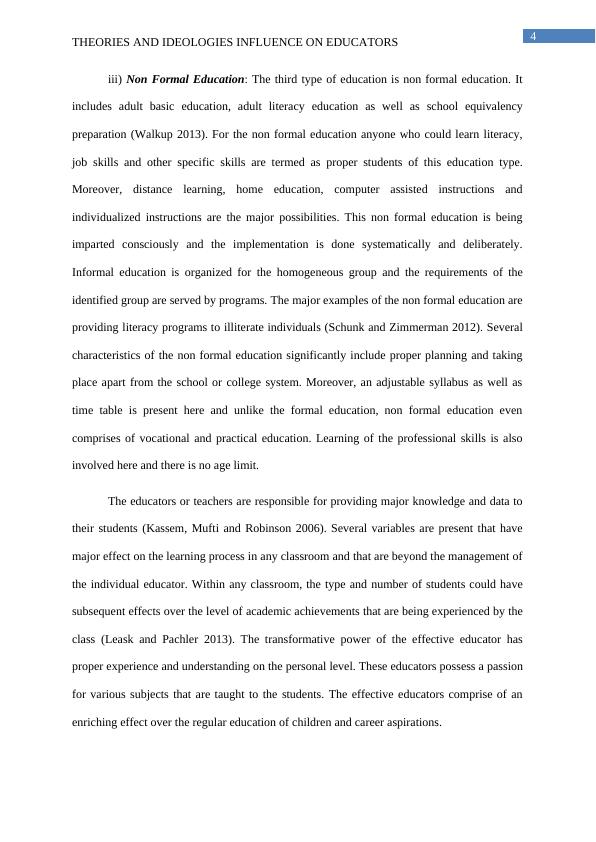
5
THEORIES AND IDEOLOGIES INFLUENCE ON EDUCATORS
The content knowledge, certification status, pedagogical knowledge and ability in
using range of teaching strategies as well as enthusiasm for the subjects eventually
characterize more effective educators (Pollard 2002). The significant and the most important
qualities of an effective educator mainly include formal teacher preparation training,
respectful, fair and caring, higher expectations for themselves and the students, dedication of
extra time for instructional reflection and preparation, maximization of instructional time
through management as well as organization of effective classroom, demonstration of
effectiveness with the full range of student abilities and enhancement of instruction by simply
varying the instructional activities, assignments and strategies.
The impact of the educator effectiveness on the student’s achievement. The lower
achieving students are considered to have lesser effective educators and when any student has
higher achievement, it is mainly dependent on the educator’s impact (Kassem, Mufti and
Robinson 2006). The negative effects of these lower effective educators could eventually
strongly affect the career aspirations of students majorly. Evaluation systems of educator are
intended in serving the core purpose to provide guidance and feedback for improvement of
professional practices. The fundamental purpose of teacher evaluation for the improvement of
performance and accountability documentation is identified easily with any complexity
(Cooper, Williams and Underwood 2015). However, there are some of the drawbacks of this
traditional evaluation process of educators.
The collective nature of accountability and responsibility of the educator is also
checked here. The first priority of the educator is to understand the student requirements and
how the student can achieve his or her objectives and can become successful in career and
life. These educators even could measure the student learning and hence the accuracy of
grading processes is measured by them (McDougall and Peim 2007). Moreover, educators
THEORIES AND IDEOLOGIES INFLUENCE ON EDUCATORS
The content knowledge, certification status, pedagogical knowledge and ability in
using range of teaching strategies as well as enthusiasm for the subjects eventually
characterize more effective educators (Pollard 2002). The significant and the most important
qualities of an effective educator mainly include formal teacher preparation training,
respectful, fair and caring, higher expectations for themselves and the students, dedication of
extra time for instructional reflection and preparation, maximization of instructional time
through management as well as organization of effective classroom, demonstration of
effectiveness with the full range of student abilities and enhancement of instruction by simply
varying the instructional activities, assignments and strategies.
The impact of the educator effectiveness on the student’s achievement. The lower
achieving students are considered to have lesser effective educators and when any student has
higher achievement, it is mainly dependent on the educator’s impact (Kassem, Mufti and
Robinson 2006). The negative effects of these lower effective educators could eventually
strongly affect the career aspirations of students majorly. Evaluation systems of educator are
intended in serving the core purpose to provide guidance and feedback for improvement of
professional practices. The fundamental purpose of teacher evaluation for the improvement of
performance and accountability documentation is identified easily with any complexity
(Cooper, Williams and Underwood 2015). However, there are some of the drawbacks of this
traditional evaluation process of educators.
The collective nature of accountability and responsibility of the educator is also
checked here. The first priority of the educator is to understand the student requirements and
how the student can achieve his or her objectives and can become successful in career and
life. These educators even could measure the student learning and hence the accuracy of
grading processes is measured by them (McDougall and Peim 2007). Moreover, educators
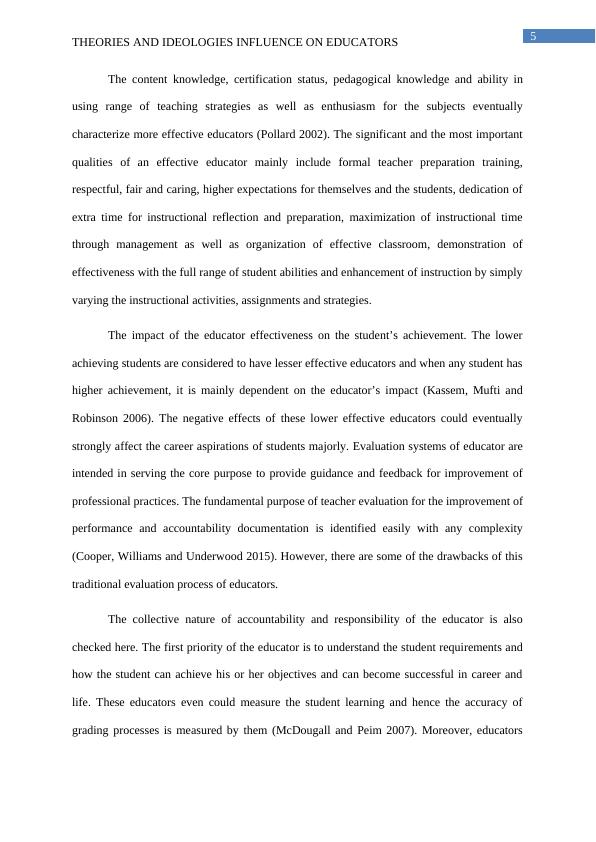
End of preview
Want to access all the pages? Upload your documents or become a member.
Related Documents
The Teaching Assignment: Teaching Practicelg...
|14
|3661
|164
Role of Questioning in English GCSE KS4lg...
|19
|7597
|44
Is More Homework Good or Bad for Primary School Children?lg...
|11
|3452
|42
Co-evolving Relationship between Citizenship and Welfare Provisions in Educationlg...
|10
|3144
|358
Theories, Principles, and Models of Learning in Education and Traininglg...
|19
|6448
|30
Cambridge International Certificate in Teaching and Learninglg...
|10
|3013
|180
